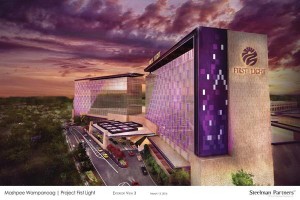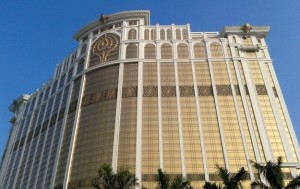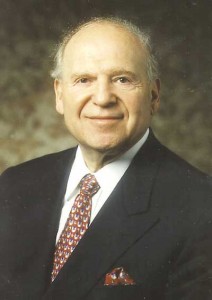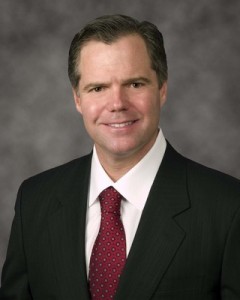In the latest twist of the Project First Light saga, the Justice Department has  interceded on behalf of the Mashpee Wampanoag. It has asked a federal judge to revisit his ruling that the Mashpee lacked standing and that the Interior Department erred by taking the Taunton land into trust. Justice’s intervention hinges upon the distinction between “federal jurisdiction” and “federal jurisdiction.” At the time of 1934’s Indian Recognition Act, a Godzilla-sized stumbling block, the Mashpee were unrecognized but nevertheless under federal jurisdiction. Judge William G. Young‘s ruling has put an enormous crimp in the tribe’s plan to open First Light by next summer: construction is at a halt.
interceded on behalf of the Mashpee Wampanoag. It has asked a federal judge to revisit his ruling that the Mashpee lacked standing and that the Interior Department erred by taking the Taunton land into trust. Justice’s intervention hinges upon the distinction between “federal jurisdiction” and “federal jurisdiction.” At the time of 1934’s Indian Recognition Act, a Godzilla-sized stumbling block, the Mashpee were unrecognized but nevertheless under federal jurisdiction. Judge William G. Young‘s ruling has put an enormous crimp in the tribe’s plan to open First Light by next summer: construction is at a halt.
“We’ve been on our land for thousands of years, and all we seek is the right to exist here as a sovereign people. It was promised to us soon after the first Pilgrims arrived, and it’s a promise we hope the courts will honor,” tribal Chairman Cedric Cromwell told the Boston Globe. There’s a lot more at stake than a casino. If Young’s ruling is not reversed, the tribe could lose 170 acres of reservation in Mashpee itself. Nothing comes easily for the tribe, whose struggle for prosperity has been hard-earned.
* In a win-win scenario, casino profits financed the purchase by the Osage Nation of 43,000 acres of ranch land near Hominy, Oklahoma. They also made Ted Turner — who sold the prairie acreage — $74 million richer. Both parties received a congratulatory message from President Barack Obama. Turner had one overriding concern about the sale. “I want this land preserved for generations to come,” he told Chief Geoffrey Standing Bear, who responded that “It will be forever.” Standing Bear made good on his promise early when he ashcanned a proposal to ranch wild mustangs on the land, which would make a quick buck but “would take a heavy toll on the land.” Bison are a possibility, as are cattle. The prairie was indigenous Osage land before the federal government pushed them off it in the early 20th century. As Standing Bear said, “You will not find such names among us as profit, rent or return on investment.” The Turner acreage is but a fraction of the former Osage Nation, but it’s a good start. (By the way, the American Gaming Association has announced that tribal gaming generated $4.2 billion in economic activity in the Sooner State, presumably using 2015 figures.)
* There’s a new top dog in Macao and it’s Galaxy Entertainment. The local construction firm-turned-casino operator had the largest market share in the first half of  2016. It was also the only operator to record a gain in profitability. Its $3.1 billion haul easily eclipsed Las Vegas Sands‘ $2.6 billion, a fact that must be giving Sheldon Adelson fits. Of course, Sheldon will be firing back on Sept. 13, when he opens Parisian Macao, a $2.7 billion spin of the roulette wheel. The secret of Galaxy’s success was growth of its mass-market play by 22%. Very high hotel occupancy also helped, as did diversification of its attractions, which produced a substantial increase in revenue. Remarkably, Galaxy also managed to eke out $103 million in cost cuts without pink-slipping any staff.
2016. It was also the only operator to record a gain in profitability. Its $3.1 billion haul easily eclipsed Las Vegas Sands‘ $2.6 billion, a fact that must be giving Sheldon Adelson fits. Of course, Sheldon will be firing back on Sept. 13, when he opens Parisian Macao, a $2.7 billion spin of the roulette wheel. The secret of Galaxy’s success was growth of its mass-market play by 22%. Very high hotel occupancy also helped, as did diversification of its attractions, which produced a substantial increase in revenue. Remarkably, Galaxy also managed to eke out $103 million in cost cuts without pink-slipping any staff.
Even so, Galaxy Deputy Chairman Francis Lui wasn’t taking a victory lap. “The market is showing signs it has hit bottom. It is too early to definitively call [it] the bottom of the market.” Not taking any chances, Galaxy plans to shave another $37 million off its budget in the remaining half of the year.
* Speaking of Adelson, his minions are insistent that Nevada taxpayers be soaked for $750 million for a [your city here] Raiders stadium — or else. Turning up the pressure, they’re  demanding that the Legislature be called into special session to expedite the deal. Sands Lobbyist Numero Uno Andy Abboud admitted he’d been pestering lawmakers twice, even thrice a day to get them into line. At Sands’ presentation, stadium backers trotted out new renderings of a $1.3 billion, transparent-roofed stadium, just south of Mandalay Bay. Mayor Carolyn Goodman continues push for repurposing Cashman Field as a stadium site but isn’t finding any takers. To try and sweeten the stadium committee’s medicine, Chairman Steve Hill said, “The public is not making a contribution to a privately owned stadium.” Hmph. Tell that to the Marines. (Sands previously nixed a compromise that would have pushed the public contribution down to $550 million.) Tellingly, local investors are shying away from the project. Adelson, by the way, has a net worth of $29.5 billion. If he wants this stadium so badly, why doesn’t he sell some Sands stock and build the damn thing himself? As for the Malosos, they must be feeling pretty confident, considering that they’ve trademarked “Las Vegas Raiders,” just in case.
demanding that the Legislature be called into special session to expedite the deal. Sands Lobbyist Numero Uno Andy Abboud admitted he’d been pestering lawmakers twice, even thrice a day to get them into line. At Sands’ presentation, stadium backers trotted out new renderings of a $1.3 billion, transparent-roofed stadium, just south of Mandalay Bay. Mayor Carolyn Goodman continues push for repurposing Cashman Field as a stadium site but isn’t finding any takers. To try and sweeten the stadium committee’s medicine, Chairman Steve Hill said, “The public is not making a contribution to a privately owned stadium.” Hmph. Tell that to the Marines. (Sands previously nixed a compromise that would have pushed the public contribution down to $550 million.) Tellingly, local investors are shying away from the project. Adelson, by the way, has a net worth of $29.5 billion. If he wants this stadium so badly, why doesn’t he sell some Sands stock and build the damn thing himself? As for the Malosos, they must be feeling pretty confident, considering that they’ve trademarked “Las Vegas Raiders,” just in case.
* It’s fourth-and-long time for FanDuel and DraftKings after they bombed with the Nevada Gaming Policy Committee. Among the factors working against them at this point are that daily fantasy sports isn’t lucrative enough to make the state want to play ball, as it were, and the opposition of companies like Station Casinos and Caesars Entertainment, who believe that a carve-out for DFS renders their sports books second-class corporate citizens (and more heavily taxed ones, to  add insult to injury). The DFS biggies, for their part, feel that accepting gambling licenses in Nevada would stigmatize the industry in other states, maybe call its very nature into question. (A not-illegitimate concern.) Considering that DFS operators are willing to pay $50,000 a year to do business in New York State, their offer of $10,000 a year to Nevada also looks unconvincing. A possible compromise, supported by MGM Resorts International CEO Jim Murren, would create a new regulatory subcategory for peer-to-peer wagering, under which rubric DFS would be defined as a skill-based activity. Now he has to run it up the flagpole and see if anybody else in the casino industry salutes. A preview of the likely response was provided by attorney Frank Schreck, who said, “It clearly will take wagering dollars out of sports books. If you are going to do that, what’s the offsetting benefit to the state of Nevada or the industry?” Sports books have done very well for the Silver State. In a cost/benefit analysis, outsourcing some of that revenue to DFS may come out a loser.
add insult to injury). The DFS biggies, for their part, feel that accepting gambling licenses in Nevada would stigmatize the industry in other states, maybe call its very nature into question. (A not-illegitimate concern.) Considering that DFS operators are willing to pay $50,000 a year to do business in New York State, their offer of $10,000 a year to Nevada also looks unconvincing. A possible compromise, supported by MGM Resorts International CEO Jim Murren, would create a new regulatory subcategory for peer-to-peer wagering, under which rubric DFS would be defined as a skill-based activity. Now he has to run it up the flagpole and see if anybody else in the casino industry salutes. A preview of the likely response was provided by attorney Frank Schreck, who said, “It clearly will take wagering dollars out of sports books. If you are going to do that, what’s the offsetting benefit to the state of Nevada or the industry?” Sports books have done very well for the Silver State. In a cost/benefit analysis, outsourcing some of that revenue to DFS may come out a loser.
* Donald Trump‘s current ubiquity has created a cottage industry in the book business. (It’s an ill wind indeed that doesn’t blow somebody some good.) The one I most want to read is Gary Trudeau‘s Yuge!, which validates Trump’s remark, “My cartoon is real. I am the creator of my own comic book.”

